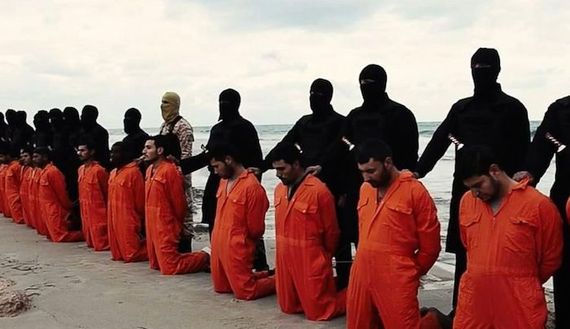
"The enemy of my enemy is my friend" is an adage more pertinent to the Middle East than to any other region of the world. Overlapping alignments make for strange bedfellows as alliance patterns frequently put hostile states on the same side of a conflict. The Syrian civil war, and the auxiliary fight against ISIS, has created a complex situation whereby coalitions are simultaneously competing and overlapping.
In the Syrian civil war, Assad is relying on Hezbollah, Iran, Iraqi Shi'ite militias and Russia to prevent the collapse of his regime. The Free Syrian Army, Kurdish Peshmerga forces, and extremist Sunni militants -- including the al Qaeda affiliate al-Nusra, as well as ISIS -- are fighting back. The fracturing of Syria along ethnic, religious, and ideological lines is only compounded by foreign intervention.
Of course, those groups backing the Syrian regime are also fighting ISIS. At the same time, the U.S. has amassed an anti-ISIS coalition of European and Middle Eastern states -- including Saudi Arabia, Jordan, Qatar, Turkey, and others -- that are assisting in combat missions strewn between Syria and Iraq. While both sides are waging war against the same enemy, they are also competing with each other. The result is an uncoordinated web of conflict, largely driven by even more complex regional and international dynamics.
Since the 2003 ouster of Saddam Hussein, Iran and Saudi Arabia have become increasingly bitter enemies. Jordan's King Abdullah has called for a coherent containment strategy to combat the growth of a so-called "Shi'ite Crescent" dominated by Iran. Turkey is concerned with a spillover of the Syrian conflict while simultaneously maintaining an ongoing battle with the Kurds. Russia and Iran seek to maintain their influence in Syria, while the U.S and Gulf states attempt to thwart those efforts. And if this is not enough, the U.S. and Russia are increasingly distrustful of each other's intentions.
What is at stake in this utter lack of direction is ISIS's ability to take advantage of those divisions. While the militant group has no real allies, the lack of a united front keeps the Russian and American backed coalitions in a holding pattern to prevent an accidental encounter that could further escalate the conflict.
If the danger that ISIS poses to the global community was ambiguous last week, the threat was made abundantly clear after the horrific 11/13 attacks in Paris. Not only has the militant group been able to consolidate power over a brutal caliphate in Syria and Iraq, it has successfully targeted Turks, Russians, Lebanese, and now, the French in menacing, premeditated attacks.
And these are not "lone wolf" events. Intelligence increasingly points to closely coordinating cells whose tentacles all lead back to ISIS's locus of power. Unlike the aims of its terrorist predecessors, they make no political or religious distinctions between their victims. Anyone perceived to stand in the way is made a bloody target. That includes Westerners, Easterners, and Muslims -- especially Shi'ites, but also Sunnis.
With France now mobilizing rapidly, the time is ripe to forge a broader coalition that includes countries of all stripes who are threatened by ISIS. That coalition must include Russia, and by extension, Iran. After the bombing of the Russian airliner, it will not be a hard sell to refocus Putin's efforts on targeting the militants first, and dealing with the broader Syrian conflict later. After all, for ISIS, Assad is enemy #1.
Given the current situation and increased pressure on Putin, the U.S. must overcome its aversion to working with Russia, its fixation with opposing Assad, and its principled objection to fighting alongside Iran. ISIS is a far more serious problem than Russia, Iran, or Assad, and in fact, all three have fallen victim to ISIS's brutality.
For all of Assad's faults, ISIS is a bigger threat to the country, the region, and increasingly, to the international community. It is impossible to successfully combat ISIS without prioritizing its defeat. The notion that defeating ISIS first requires resolving the Syrian conflict is misguided: Assad's strongest justification for holding on to power is to prevent a takeover by extremist militants. The U.S. cannot crush ISIS, force Assad to step down, condemn Russian combat missions, and isolate Iran simultaneously. Coordination by American, European, Russian, and regional partners would create a fighting force against which ISIS could not compete in the long run.
Additionally, a coalition that includes Russia, Iran, and other Arab partners would blunt criticisms of another Western war in the Middle East that fuels anti-Western sentiments in the region. A global force is pragmatically and symbolically crucial. Including a broader range of countries would also diversify tasks and increase burden-sharing, since at some point, boots will have to be put on the ground. Yet, those boots do not necessarily have to be American ones.
In the United States, the domestic debate is too narrowly focused on whether, or how many, troops the U.S. needs to deploy. By creating an expansive working coalition, the U.S. can rely on American, French, Russian, Iranian, Kurdish... and so on... expertise instead of taking on all the tasks, and risks, associated with defeating ISIS.
Amassing such a coalition will not be an easy task. It will take a good deal of arm-twisting to convince the Saudis to work alongside the Iranians. It will require strong political leadership to convince the American public that Russia is a critical partner in this fight. But to claim the mantle of global leadership will require the U.S. to look beyond comfortable allies and to instead embrace the strange, yet multiplying, bedfellows that all seek to destroy ISIS.
Working with Russia and Iran to defeat ISIS now does not preclude us from opposing their actions later. During WWII, the U.S. and the Soviet Union were able to put aside differences to successfully fight and defeat Nazi Germany, then quickly resorted back to a 40-year long Cold War. Such a coalition can again be amassed and can again succeed.

